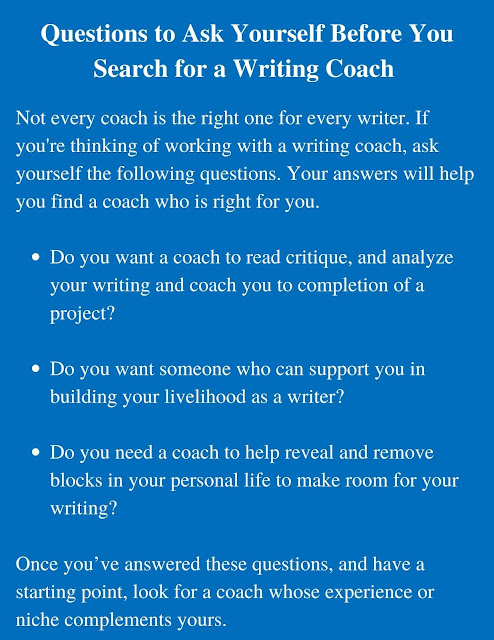It’s no secret that top athletes in any professional sport work with a personal coach at one time or another during their careers.
A good coach can help an athlete attain the peak performance needed to get to the top of his game.
In today’s highly competitive world of publishing, many writers are now turning to personal writing coaches to help them get to the top of their games, too.
So, what can you expect from a writing coach?
A lot, actually.
Here are some of the many benefits of working with a writing coach:
√ A good coach helps a writer stay motivated by providing constant feedback and encouragement.
A writer not working alone, and accountable to the coach on a regular basis, finds it’s easier to keep going until a project is completed.
√ A good coach provides a system for success that the writer can stick with.
It’s often difficult for a writer to break down a project into smaller activities and learn how to do this with any type of project.
A good coach helps develop a system based on an individual’s particular writing and working style, while taking other, non-writing responsibilities and commitments into account.
√ A good coach helps the writer learn to set realistic goals and stay focused on them.
This is perhaps one of the greatest benefits of a writing coach.
Writers are creative people and may be easily distracted by other exciting opportunities and creative ideas that come their way.
A writer can learn not to become distracted by other possibilities when having a tough time with a current project.
√ A good coach helps a writer get going again when stuck or off-track.
A good coach will see that projects no longer end up as unfinished manuscripts tucked away in drawers or on computer files.
They will be completed.
√ A good coach offers a writer professional advice.
This is why it is so important to work with a coach who is also a professional writer, someone who knows the ropes.
√ A good coach helps a writer accurately evaluate progress.
Writers can be impatient and dissatisfied with their progress because they think they should be farther along than they are.
Publishing is a slow game and a good coach helps the client see realistically.
√ A good coach keeps the process enjoyable.
Let’s face it.
A writer who isn’t enjoying the writing and publishing process isn’t very likely to stick with it.
A good writing coach knows this and provides ways to keep the process enjoyable so the writer will attain set goals.
For more tips about working with a writing coach, get your free subscription to The Morning Nudge.
Learn more about her coaching programs and other resources for writers at writebythesea.com.






